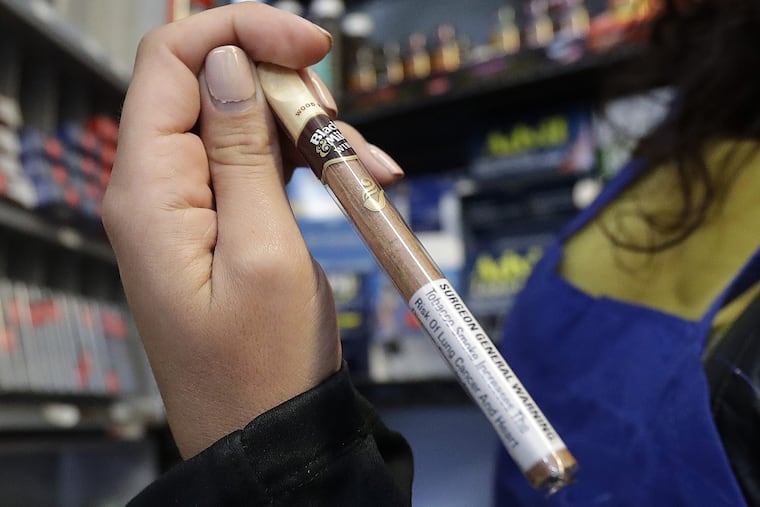The problem with kids and flavored tobacco
The Philadelphia City Council recently introduced legislation that seeks to ban flavors that appeal to children in cigar products. Here's why health care professionals support this move.

We can all remember the joy of browsing the candy aisle as kids, the temptation of those brightly-colored candy wrappers promising a fruity-sweet reward inside. Unfortunately, the tobacco industry has historically capitalized on children's love of sweets, and may be targeting them in marketing campaigns once again.
While it's often adults who face the consequences of long-term tobacco use, we – as researchers and practitioners who have studied this issue closely – see a consistent pattern of the tobacco industry working to attract new customers from childhood. This concerns us because each day nearly 2,100 youth become daily cigarette smokers, and one out of every three young smokers—5.6 million children today—will die early because of tobacco use. Recognizing this, the Philadelphia City Council recently introduced legislation that seeks to ban flavors that appeal to children in cigar products, eliminating one of the industry's primary marketing tactics and giving our young people a fair chance to lead tobacco-free lives.
Based on evidence that cigarettes flavored with candy and fruit encourage youth experimentation, regular use and addiction, the Family Smoking Prevention and Tobacco Control Act of 2009 banned all cigarettes containing flavors except tobacco and menthol. The ban appears to be working. It has been associated with a decrease in the number of cigarettes smoked among youth by 58 percent and the likelihood of smoking cigarettes overall in this age group by 17 percent.
While this data is encouraging, efforts to curb smoking initiation among youth face a new threat. Tobacco companies also develop and market cigars, smokeless tobacco, and electronic cigarettes. These products are not subject to the same restrictions as cigarettes, so adding flavors to them has not come under the same scrutiny. As a result, there are now more than 250 flavors of cigar products, everything from cotton candy to strawberry.
The public health implications of this trend have been significant. We have already seen a shift towards the use of non-cigarette tobacco products preferentially among youth and young adults across the country. In Philadelphia, teen cigar and "cigarillo" or little cigar use rose by more than 75 percent between 2011 and 2015, such that cigar use is now more common than cigarette use. The appeal of these products for youth is addicting a new generation of users and undoing progress made by previous tobacco control policies.
Flavored cigars and cigarillos are major "starter products" that get kids hooked on tobacco by masking the harshness of smoke and making the smoking experience more tolerable and enjoyable. Over 80 percent of adolescents and young adults who have tried tobacco report that their first product was flavored. When asked why they use tobacco, young users consistently say it is because they like the flavors.
Youth are also more likely to experiment because they might think flavored products, especially cigars and cigarillos, are more "natural" and less harmful than cigarettes. In reality, the same toxic and cancer-causing chemicals in cigarettes are produced in cigars at even higher levels. Still, their brightly-colored foil packaging, wide variety of flavors and fruity-sweet smells only create false-positive images for kids. Flavored tobacco lowers the perceived harm and increases the social acceptability of using tobacco, ultimately increasing youth experimentation.
The long-term consequences of tobacco use are devastating for patients and their loved ones. The progressive damage to the heart, lungs and blood vessels can severely limit one's ability to function independently. Smoking also increases the risk of cancer in nearly every body part, from the mouth to the colon. In fact, the health consequences are so extensive that smoking continues to be the leading cause of preventable death in the United States. Preventing children from ever picking up their first tobacco product is by far the best thing we can do to protect them from tobacco-related disease and death.
In Philadelphia, we have the opportunity to use effective policy to close the flavor loophole. The country's leading medical and health advocacy groups, from the American Academy of Pediatrics to the American Cancer Society, all agree that flavored tobacco products are made for the purpose of attracting kids and fueling the addiction of a new generation of lifelong users. Several major U.S. cities, including Chicago and Minneapolis, limit the sale of flavored cigars; San Francisco moved ahead to ban all flavored tobacco products.
Philadelphia deserves the same protections, and we can't afford to wait as children and adolescents pay the ultimate price. For our youngest—and future—generations to have a fair shot at a tobacco-free life, we need to act now to prevent children's access to all flavored tobacco products.
Josephine Hwang is a Master of Public Health student at the Jefferson College of Population Health and a medical student at Sidney Kimmel Medical College. Brian Jenssen, MD, MSHP, is a faculty member at PolicyLab at Children's Hospital of Philadelphia, an instructor in the Department of Pediatrics at the University of Pennsylvania, a practicing primary care pediatrician at CHOP, and a fellow in CHOP's Entrepreneurial Science Scholars Program.